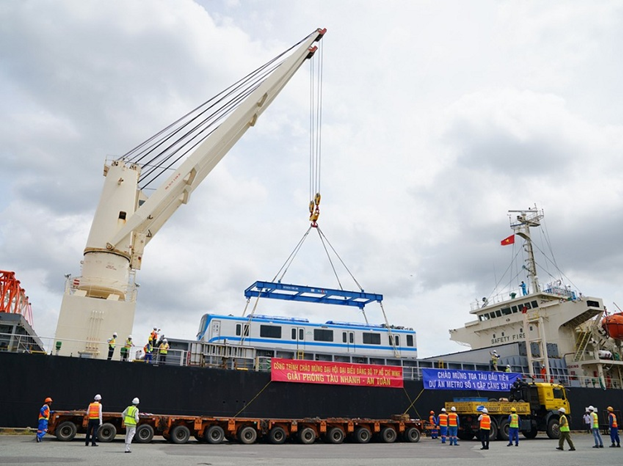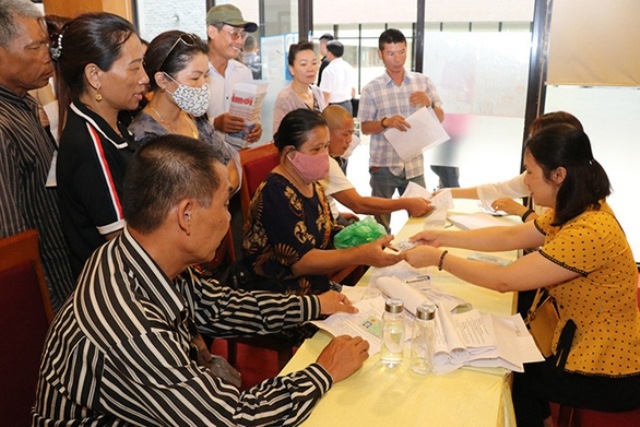 Economy
Economy


|
| Residents register for the $2.6 billion financial support package from the Government to support workers affected by the COVID-19 pandemic. — Photo dangcongsan.vn |
HÀ NỘI — Việt Nam's fiscal support package needs to contain the pandemic and minimise health and economic impacts, so it will be necessary to give priority to spending on health, social security and support for the business sector.
Chairman of the National Assembly Vương Đình Huệ yesterday chaired the Vietnam Economic Forum 2021 in Hà Nội, where economic experts discussed and suggested fiscal and monetary policies to support socio-economic recovery and development after the COVID-19 pandemic.
The forum themed "Recovery and sustainable development" was co-organised by the National Assembly Economic Committee, the Central Economic Commission and the Vietnam Academy of Social Sciences, connecting 57 locations in the country and three international ones, gathering opinions from a large number of scientists and experts in various fields.
Huệ said Việt Nam has used financial and monetary policies and other macroeconomic policies to deal with the pandemic over the last two years, adding the total size of the country’s fiscal and monetary support packages was estimated at about 4 per cent of GDP, lower than the average level of other countries in the world.
Huệ told the forum: “The development is not at all costs, but must be sustainable. We have to pay attention to immediate and urgent solutions to maintain the growth drivers to control the pandemic, support recovery and economic growth.”
But, he said: “Short-term and medium-term solutions must always stick to the long-term goal of restructuring the economy, ensuring the economy's rapid but sustainable development, not only economic problems, but also the social and environmental issues, ensuring macroeconomic stability, and controlling inflation.”
“Important solutions must be how to mobilise resources, especially in the context that Việt Nam's medium and long-term capital market is still limited,” adding: “We will allocate resources to specific targets on the basis of international experience and the practical situation of Việt Nam,” Huệ said.
He said the financial and monetary policy solutions and proposals made at the forum were not included in the one decided by the NA, but will be for additional financial and monetary frameworks.
In response, delegates of the forum said the pandemic was not just an economic-financial crisis and solutions in healthcare were crucial.
They said the objective of the fiscal support package was to contain the pandemic and minimise health and economic impacts.
Economist Cấn Văn Lực forecast the local economy would face many difficulties in 2022, adding: “Without special programmes, Việt Nam may miss opportunities and fall behind.”
Lực said policy formulation must be feasible and implemented quickly and effectively and there must be good coordination between policies.
Regarding monetary policy, the economist said: “Việt Nam should continue reducing loan interest rates from 0.5 to 1 per cent. For example, if the housing loan proposal proposed by the Ministry of Construction is VNĐ65 trillion (US$2.82 billion), the Government will need to spend about VNĐ6.1 trillion on interest."
Lực said: “It is necessary to have a loan guarantee policy for small and medium enterprises through funds in the localities.”
Together with the Ministry of Finance’s loan support package of VNĐ20 trillion - VNĐ30 trillion, an additional investment of about VNĐ150 trillion for key infrastructure projects and work, as well as other packages for healthcare and social security, Luc estimated the fiscal support packages at VNĐ278 trillion or 3.41 per cent of GDP in 2021.
In the long term, fiscal measures should gradually shift from direct support to indirect support, from financial support to mechanism support, in a way that promotes innovation, digital transformation and green and sustainable growth, said Lực.
Nguyễn Minh Cường, Chief Economist of the Asian Development Bank in Vietnam, told the forum as the pandemic continues to affect the world and the appearance of new strains were potential risks to the global economy, adding: “The gradual narrowing of the fiscal and monetary policies of countries in 2022 will also gradually narrow the time for Việt Nam if the country does not quickly implement support policies, especially in the short term."
Francois Painchaud, a representative of the International Monetary Fund (IMF) in Vietnam, said it was necessary to focus on spending instead of tax reduction or postponement measures.
He said: “Increasing public investment, as well as supporting private investment to encourage businesses to invest, is needed to meet the challenges of the fourth industrial revolution."
Nguyễn Đức Khương, deputy director in charge of research at IPAG Business School, Paris, said the innovation ecosystem will be a space for creating a new generation of employees and operating processes and boosting productivity.
He said: “Support from the State and the Government needs to focus on human resource training, capital support, risk sharing with businesses, through helping businesses take strategic actions to respond to the challenges of changing business models, investing in technology and big data to understand and reach consumers better."
He added: “The challenge of digital transformation, digital services and shared platforms is all related to human resources.”
Bùi Quang Tuấn, director of the Vietnam Economic Institute, said Việt Nam’s competitiveness towards ASEAN countries was low while the investment in technology from the State budget was decreasing, while it was increasing in other countries.
Tuấn said it was a golden opportunity for Việt Nam's digital economy at present, saying: “It is necessary to increase investment, invest in materials, invest in resources and improve and perfect institutions.”
Tuấn said only with such investment would Việt Nam adapt to the changes that are happening very quickly.
In other sessions of the forum, delegates discussed practical solutions to help Việt Nam overcome difficulties and quickly recover after the pandemic.
Chairman of the National Assembly Vương Đình Huệ said: “If policies, especially macro policies, do not match reality, the policy itself will be misleading.” VNS




